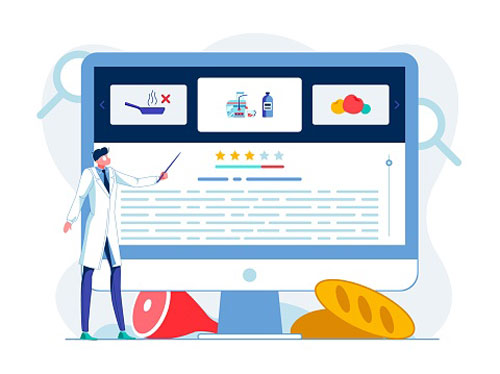Building a website that drives traffic and generates revenue for your business is both an art and a science. Understanding the basics of SEO is not only recommended; it is a requirement if you are going to manage your own website marketing strategies. While it is strongly suggested that you hire a professional for SEO development, those intrepid entrepreneurs who want to do it on their own can benefit from these seven ways to start to improve your SEO.
What is SEO?
Search Engine Optimization is the practice of improving the quality and quantity of traffic to your website or webpage in organic (non-paid) searches using techniques that help your website rank higher in search engine results pages (SERPs). The goal of SEO is to be sure your website is listed high in the rankings so more people will see it. The better visibility you have, the more your website attracts prospective and existing customers to your business.
Why Does SEO Matter?

SEO is important because it drives traffic and leads to your website. Without traffic, you are less likely to generate sales resulting in revenue. The use of SEO allows you to reach people when they are actively searching for information about your product or service. Effective SEO puts you at the top of the search when your target audience is ready to make a buying decision – this is the sweet spot for conversion from website visitor to customer.
Why is Setting a Baseline of Your SEO Important?
SEO campaigns can take off in a cloud of excitement and enthusiasm, but without proper tracking, that energy and engagement can taper off quickly. You can effectively and accurately track your SEO goals using Google Analytics. Better understand your customers and track your ROI through four specific user interactions that are meaningful to your bottom line.
4 Google Analytics Goal Types:
- Destination
- Duration
- Pages/screens per session
- Event
Establishing baselines in each of these goal types will help you define where you began, what measurable results have been achieved, and potentially reveal additional areas of opportunity. SEO strategies are dynamic, achieving different levels of success in any given month. Use your baseline data and metrics to see where you have been and establish where you are going.
What are the 3 Types of SEO?
There are three types of SEO that you can put to work for you on your business website. There is no order of importance among the three, and they should be employed depending on your industry, competition, and priorities, in addition to other factors specific to you. These three types are:
- On-page SEO
- Off-page SEO
- Technical SEO
On-Page SEO includes anything on your website that will help your site in the rankings. Product copy, collection copy, blogs – any copy on your web pages that include keywords that match search queries. This can also include title tags, image-alt tags, and internal links between relevant content.

Off-Page SEO includes actions taken away from your website. It does not require any changes to the pages of your website but rather builds page authority for your site by transferring page authority from another website to your website. This can be done through social media marketing, guest blogging, brand building, and, more commonly, backlinks.
Technical SEO is any technical action taken with the intent to improve search results. There are specific actions you can take to improve your website results in SERPs, including reducing the image file size for faster download speeds and optimizing your website for mobile use. Improvements in technical SEO can create a better user experience for the Google bot crawling your site as well as for the people landing on your page as the result of an organic search.
7 Ways to Start Improving Your SEO Today:
1. Keyword Research/Keyword Strategy
2. Complete a technical SEO audit
3. Check page site speed
4. Set up Google Search Console and Google Analytics
5. Update content
6. Write a blog
7. Check your domain authority
1. Keyword Research/Keyword Strategy

Keyword research is necessary for determining more than just the words you want to rank for. It helps you understand what words your target audience is using to search for products and services such as yours. Keyword strategy considers your target audience – who they are and their buying goals – and develops search terms with both high- and low-competition search volume. Establishing a buyer persona is a crucial planning step that should not be bypassed in your research and developing a strategy.
2. Complete a Technical SEO Audit
Completing a technical SEO audit on your website is how you assess your website’s health and ensure it is up-to-date and remains relevant on search engines.
Schedule time on a regular basis to check your website for:
- Broken links
- Poor images
- Page title issues
- Duplicate content
- Unlinked pages
3. Check Your Page Site Speed
People don’t like to wait for websites to load, and the longer it takes, the more likely your potential customer will move on to the next website. Five seconds is the difference between success and a 90% bounce rate.
Check your site’s page speed using the Google PageSpeed checker and see what adjustments you can make to help increase page speed. Use Google PageSpeed Insights to see how your website is performing and receive suggestions for page speed improvements as well.
4. Set Up Your Google and Bing Search Consoles
There are many reasons why using web analytics and reporting tools is a quick and easy way to improve your SEO. First and foremost – it’s free. The insights and customizable reports provide key insights into how your website is performing and what you need to do to meet your goals. Make sure you have Google Analytics, Google Search Console, and Bing Search Console set up properly and working to help you better understand your customers’ behavior and website experience.
5. Keep Your Content Updated

Why is it important to keep your site up to date? It builds trust between you and your customers because they rely on your site for useful information. Start small and create a schedule to optimize your content for search. Eventually, you will want to optimize all of your content for search but start small.
Pick five pages and update the content based on your keyword research and strategy. Regularly updated, quality content can bring you to the top of organic searches.
6. Build Site Authority with a Blog
Blogging is a highly effective way to drive traffic to your site and establish your site as a resource for people to access information. Start with just one – aim for 1,000 words on a topic around your keyword strategy. If you have more thoughts, keep going with word count and try to hit 2,000 words. Make sure to edit your blog, insert keywords, and hit Google’s current blogging standards before posting.
7. Check your Domain Authority Regularly
Knowing your domain authority is a great baseline for how you are ranking in search engines. While not a direct factor in SEO, this helps you better understand what sort of links are out there regarding your site and is a great starting point for off-page SEO. Domain authority establishes your site’s credibility with search engines and how you compare to your competition.
Is There More I Can Do to Improve SEO?

There is always more you can do for your SEO strategy. If you have already completed all of these seven suggestions and have created a strategy to continue to follow up on each activity, dig a little deeper. Write more blogs, update your old blogs, and update other content on your site. Still looking for more suggestions? Consider the following:
11 Additional Ideas to Improve SEO
1. Check your schema – important for rich results
2. Create a blog strategy and post weekly or biweekly blogs
3. Update your titles and meta descriptions
4. Update your URLs and/or URL structure
5. Create additional pages on your site for content, if needed
6. Local SEO strategy, if needed
7. Reach out to companies for backlinks
8. Update image files and add image alts based on keyword strategy
9. Update additional pages on site for keyword strategy
10. Check canonical links throughout the site
11. Additional tech audits monthly

This is by no means an exhaustive list. Your website is the most prolific worker you have in your business. Take the time to understand your website and its effectiveness, make changes and updates where needed, and that site will be the single greatest difference-maker in converting your target audience to customers.
Make time in your busy schedule to focus on your website and SEO marketing strategies and watch your website conversions make a measurable impact on your ROI.
